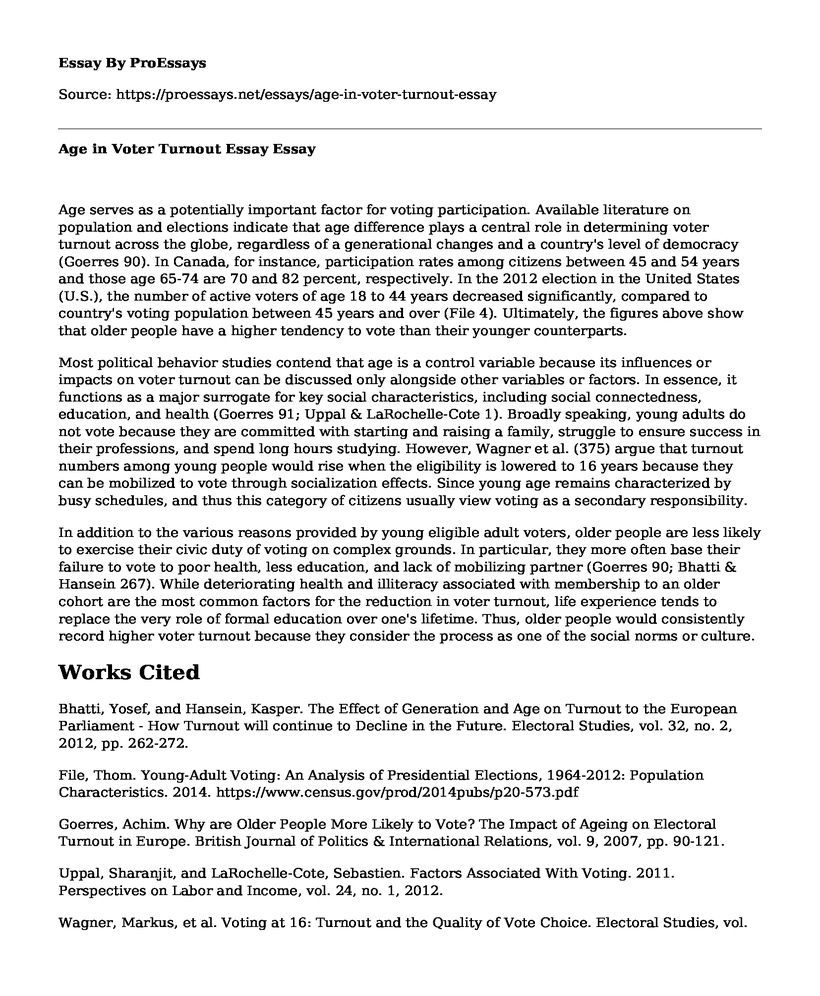Age serves as a potentially important factor for voting participation. Available literature on population and elections indicate that age difference plays a central role in determining voter turnout across the globe, regardless of a generational changes and a country's level of democracy (Goerres 90). In Canada, for instance, participation rates among citizens between 45 and 54 years and those age 65-74 are 70 and 82 percent, respectively. In the 2012 election in the United States (U.S.), the number of active voters of age 18 to 44 years decreased significantly, compared to country's voting population between 45 years and over (File 4). Ultimately, the figures above show that older people have a higher tendency to vote than their younger counterparts.
Most political behavior studies contend that age is a control variable because its influences or impacts on voter turnout can be discussed only alongside other variables or factors. In essence, it functions as a major surrogate for key social characteristics, including social connectedness, education, and health (Goerres 91; Uppal & LaRochelle-Cote 1). Broadly speaking, young adults do not vote because they are committed with starting and raising a family, struggle to ensure success in their professions, and spend long hours studying. However, Wagner et al. (375) argue that turnout numbers among young people would rise when the eligibility is lowered to 16 years because they can be mobilized to vote through socialization effects. Since young age remains characterized by busy schedules, and thus this category of citizens usually view voting as a secondary responsibility.
In addition to the various reasons provided by young eligible adult voters, older people are less likely to exercise their civic duty of voting on complex grounds. In particular, they more often base their failure to vote to poor health, less education, and lack of mobilizing partner (Goerres 90; Bhatti & Hansein 267). While deteriorating health and illiteracy associated with membership to an older cohort are the most common factors for the reduction in voter turnout, life experience tends to replace the very role of formal education over one's lifetime. Thus, older people would consistently record higher voter turnout because they consider the process as one of the social norms or culture.
Works Cited
Bhatti, Yosef, and Hansein, Kasper. The Effect of Generation and Age on Turnout to the European Parliament - How Turnout will continue to Decline in the Future. Electoral Studies, vol. 32, no. 2, 2012, pp. 262-272.
File, Thom. Young-Adult Voting: An Analysis of Presidential Elections, 1964-2012: Population Characteristics. 2014. https://www.census.gov/prod/2014pubs/p20-573.pdf
Goerres, Achim. Why are Older People More Likely to Vote? The Impact of Ageing on Electoral Turnout in Europe. British Journal of Politics & International Relations, vol. 9, 2007, pp. 90-121.
Uppal, Sharanjit, and LaRochelle-Cote, Sebastien. Factors Associated With Voting. 2011. Perspectives on Labor and Income, vol. 24, no. 1, 2012.
Wagner, Markus, et al. Voting at 16: Turnout and the Quality of Vote Choice. Electoral Studies, vol. 31, no. 2, 2012, pp. 373-383.
Cite this page
Age in Voter Turnout Essay. (2022, Mar 29). Retrieved from https://proessays.net/essays/age-in-voter-turnout-essay
If you are the original author of this essay and no longer wish to have it published on the ProEssays website, please click below to request its removal:
- Critical Thinking Example: Will NAFTA Survive a Trump's Presidency?
- Essay on Dangers in Police Realized As They Die In Line of Duty
- The Restructuring of the U.S. Health Care Delivery - Research Paper
- Essay Sample on Reparations: A Need for Federal Government to Compensate African Descendants
- Police Force: Essential for Law Enforcement and Order in a Country - Essay Sample
- US 2020 Elections - Essay Example
- Essay Sample on Electoral College System Should Be Banned







